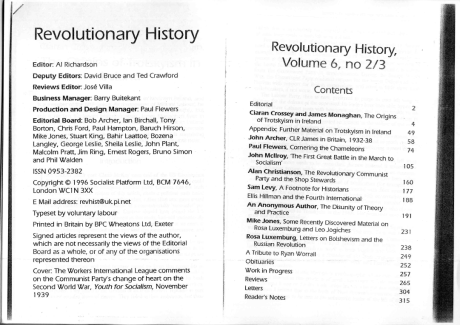Left Archive: The Origins of Trotskyism in Ireland, Ciaran Crossey and James Monaghan, Revolutionary History, Volume 6, no2/3, [Socialist Platform] 1996 December 2, 2013
Posted by WorldbyStorm in Irish Left Online Document Archive.trackback
To download the above please click the following link: Revolutionary History
Many thanks to Jim Monaghan for the following.
This is an essay written by Ciaran Crossey and James Monaghan published in Revolutionary History, published by Socialist Platform in 1996. Socialist Platform as this piece here notes:
“…is an independent, non-sectarian socialist publishing venture of militants and historians of the British far left — opposing both Stalinism and Labourism /reformism — aiming at the information and education of a new generation influenced by Trotskyism and its heritage in the Marxist movement. Socialist Platform publishes labour movement history studies hardly to find elsewhere or overlooked by other publishers, at affordable prices. It maintains an archive and a library and closely co-operates with similar working archives and publishing endeavours abroad, such as the Institut Léon Trotsky in France.”
It’s current online home is here.
As the introduction notes:
Ciaran Crossey works in the public setvice in Northern irealnd, and is a member of the MSF union. As a supporter of Mlitant Labour, he has written number of articles for the Militant Irish Monthly, but his is his first full-length historical essay. James Monaghan lives in Dublin, and has been active in the Trotskyist movement in Ireland since the early 1970s. We are sure our readers will appreciate their conscientious research and documentation, as it is surprising that this subject has not received such serious treatment until now.
The essay itself is 26 pages long and considers the historical origins of Trotskyism in Ireland. It starts with Paddy Trench who it identifies as the first active supporter of the Trotskyist movement in Ireland, that being Paddy Trench who joined the Marxist Group, and worked inside the Independent Labour Party. It notes that there was barely an handful of Trotskyists in Ireland through to the Second World War, and these mainly worked through the Irish Labour Party.
It continues by examining the Second World War/Emergency years and in particular the Workers International League which sent five members to Dublin to organise. These included Jock Haston and Gerry Healy. Again, contact was made with the left wing of the Labour Party and the younger members of the Dublin IRA. Interestingly the essay asks did the WIL ‘really establish anything in Dublin’?
The last section considers the disintegration of active Trotskyism in Ireland with the ‘demise of the Revolutionary Socialist Party in 1948’. And it argues that ‘Marxism as an organised force, was absent from the Irish political scene for the next 14 years’. Some might take issue with the bluntness of that last statement, pointing to other Marxist strands, but certainly Trotskyism as an significant current faded away, perhaps as the focus shifted to London.
Some illuminating information is uncovered in this essay and it points to the need for yet more research on the issue.


Ciaran did the vast majority of teh work. He is responsible for this incredible resource on the Spanish Civil War http://irelandscw.com/. In Galway there is a society devoted to the works of Liam and Tom O’Flatherty. https://www.facebook.com/pages/Liam-and-Tom-OFlaherty-Society/154178324729576
Seosamh Ó Cuaighas done more work on Tom and has gained ac cess to his FBI records
LikeLike
This is a great addition to the archive. Probably the most useful overview of the non-CP, non-IRA socialist left that’s available. Well done to Ciaran and Jimfor writing it.
It would be interesting to get a similarly detailed account of the “second wave” of Irish Trotskyism, basically the groups in, around or descended from the Irish Workers Group of the 60s. That’s also an essentially historical phenomenon at this point, with only Socialist Democracy still sort of standing in organisational terms. The dominant groups nowadays are a kind of third wave, with little or no connection to the IWG milieu, bar an occasional individual like McCann.
LikeLike
That’s a very interesting point you make there Mark P. I guess one could argue that the WUA/G represent a link with that albeit very attenuated at this stage, but direct organisational continuity, that’s faded away.
LikeLike
This document is a very interesting read (I hadn’t read it before).
One thing that struck me was the debate in the WIL between Bob Armstrong in Belfast and Jock Haston in Dublin on the National Question. Armstrong adopted a stages approach to the issue while Haston and the leadership of the WIL argued for a workers unity approach consistent with the current view of the Socialist Party and CWI. Interestingly Haston’s approach was more consistent with the CWI than Ted Grant whose approach was similar to Armstrong.
LikeLike